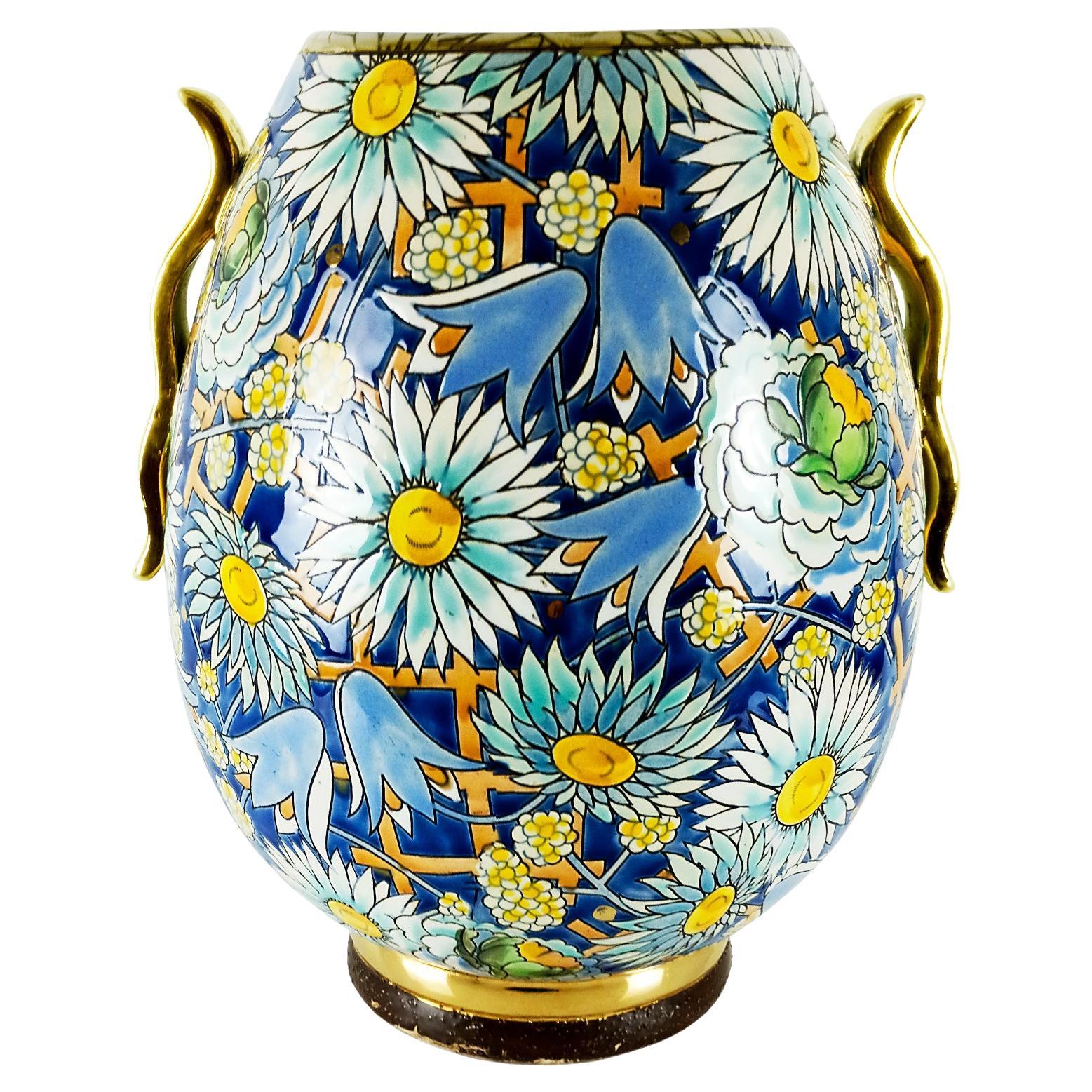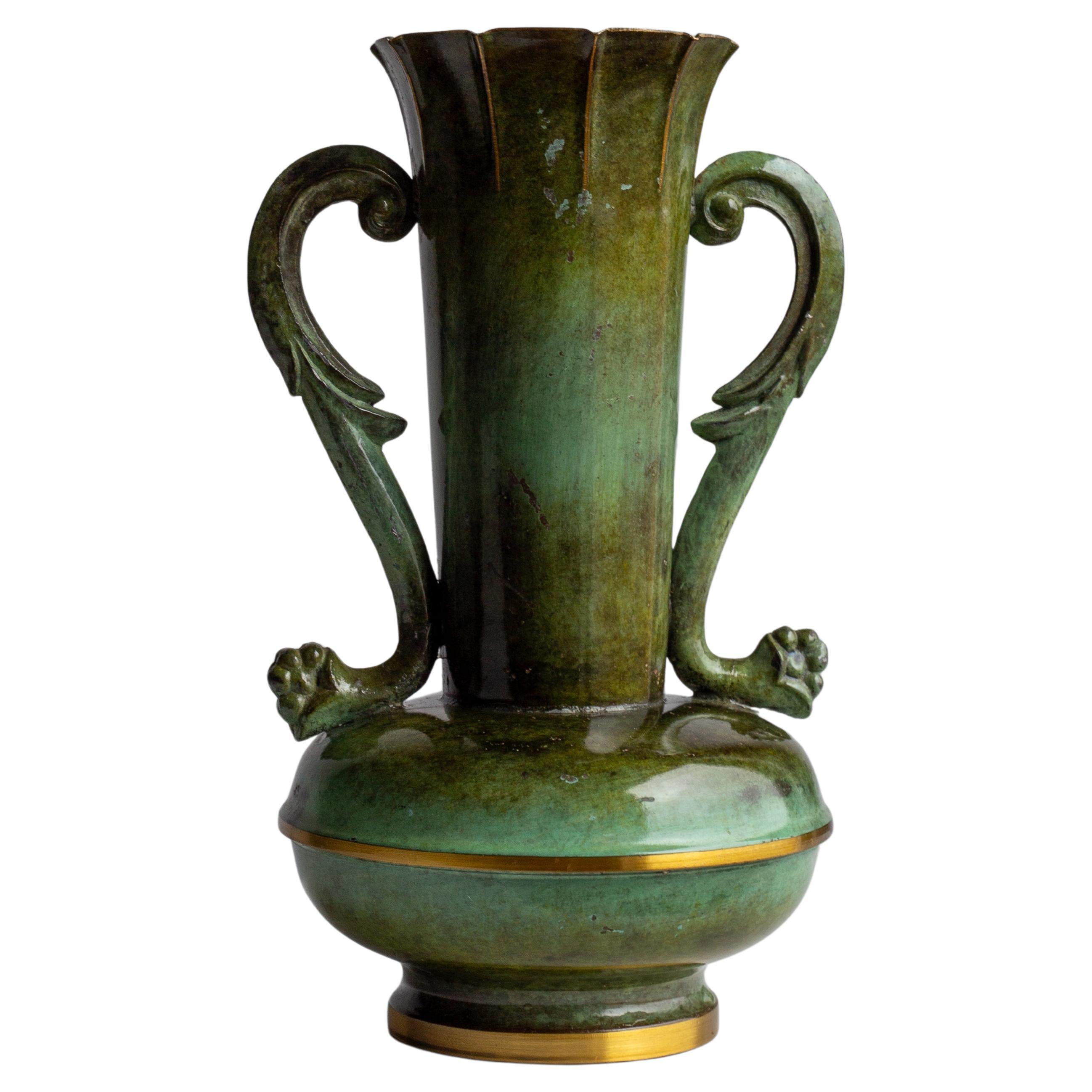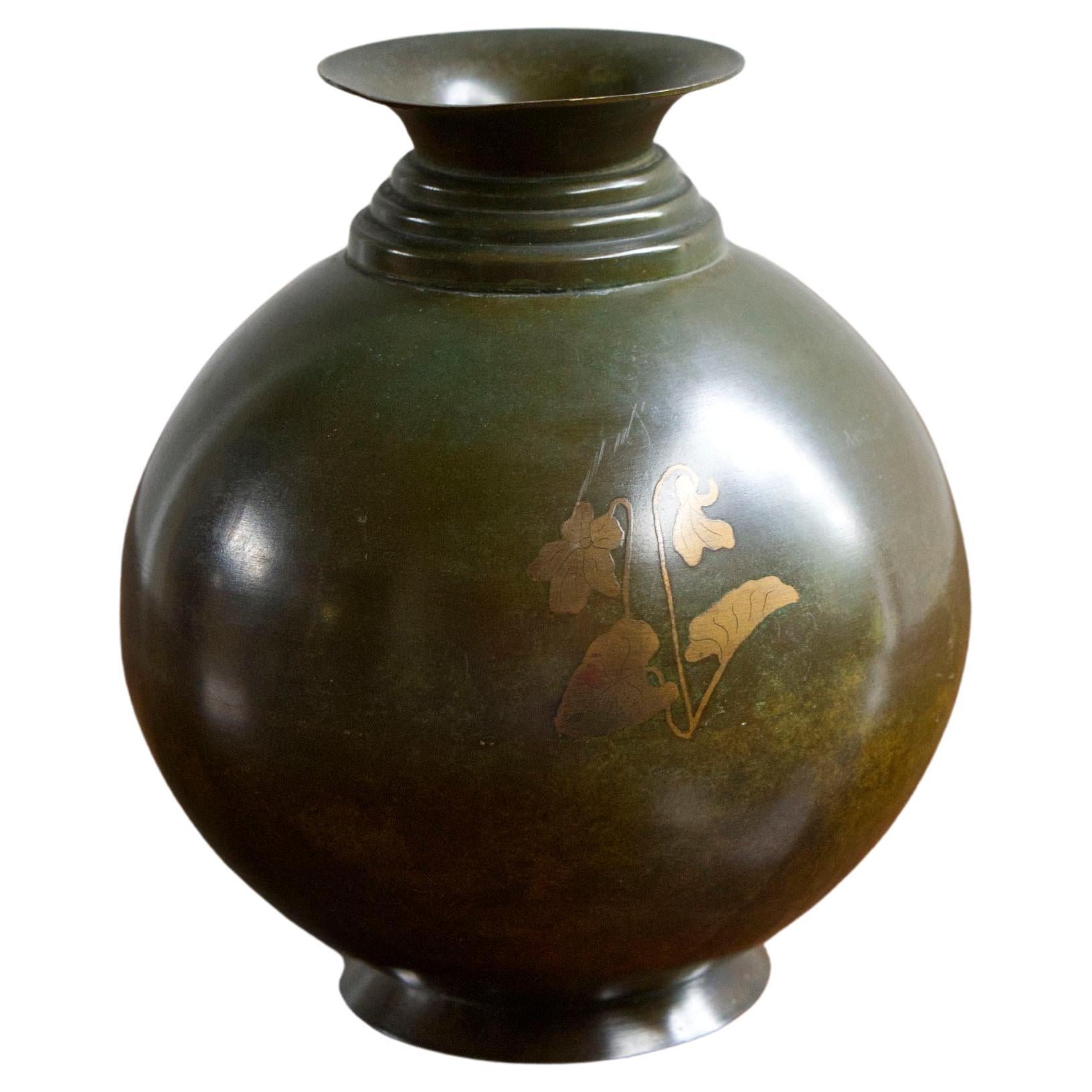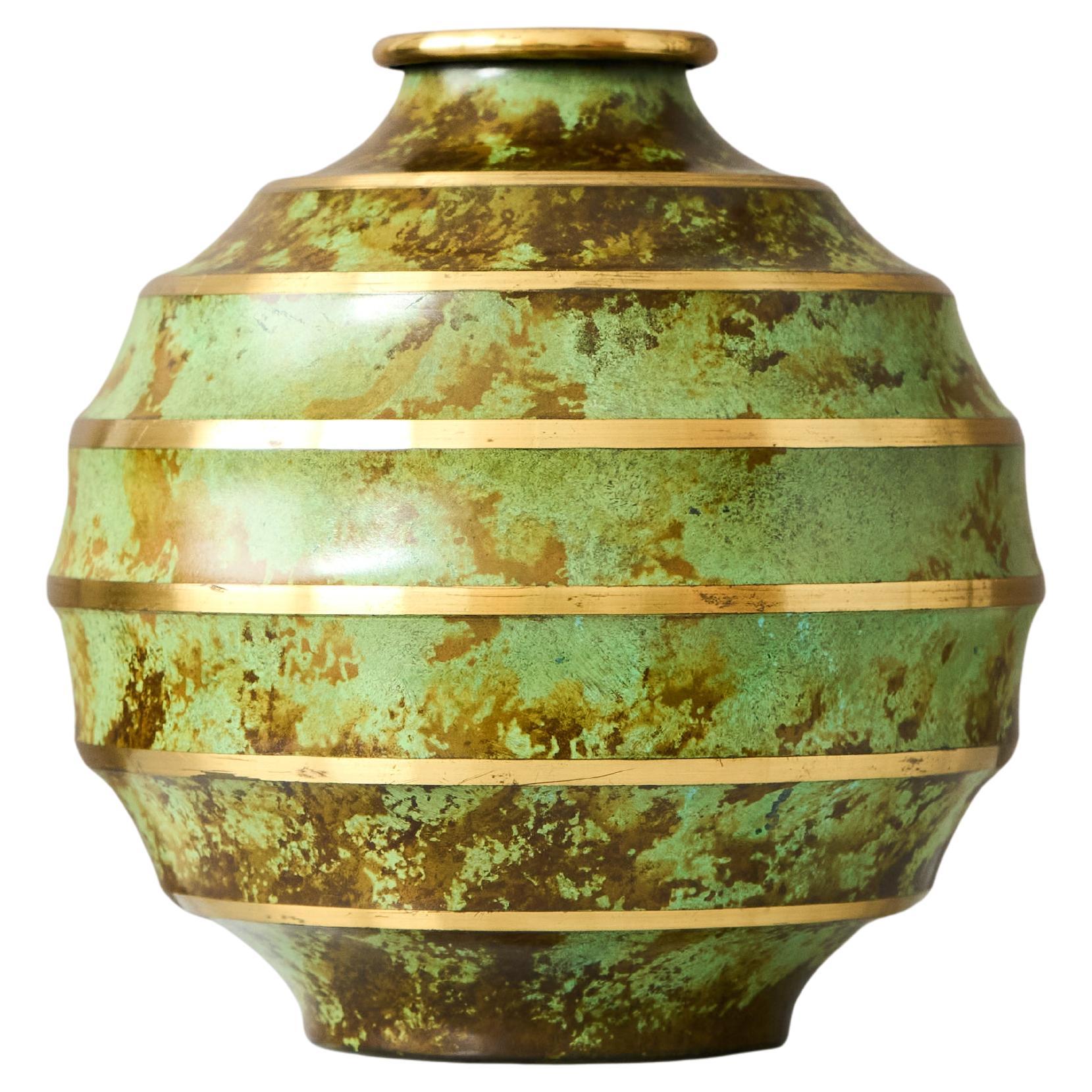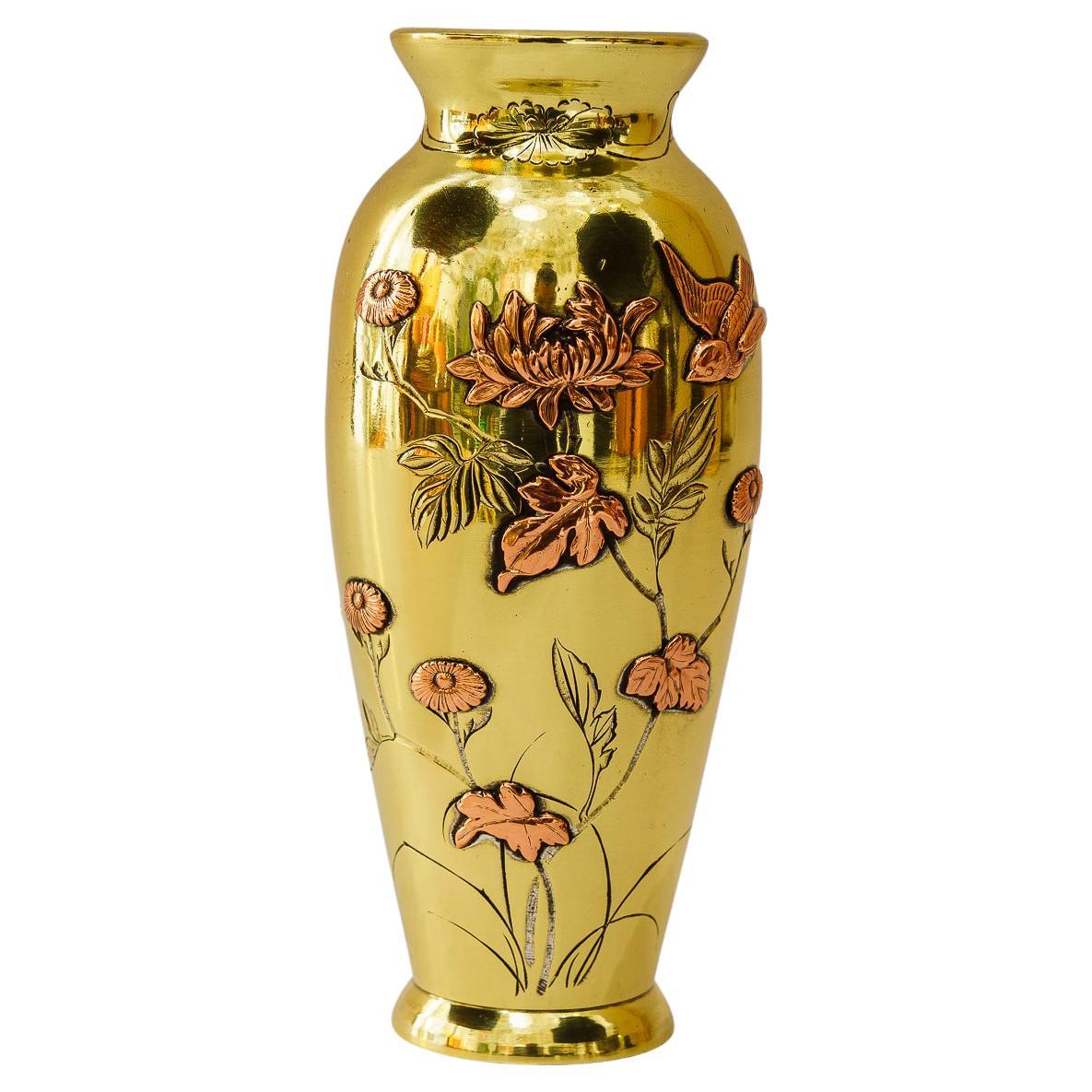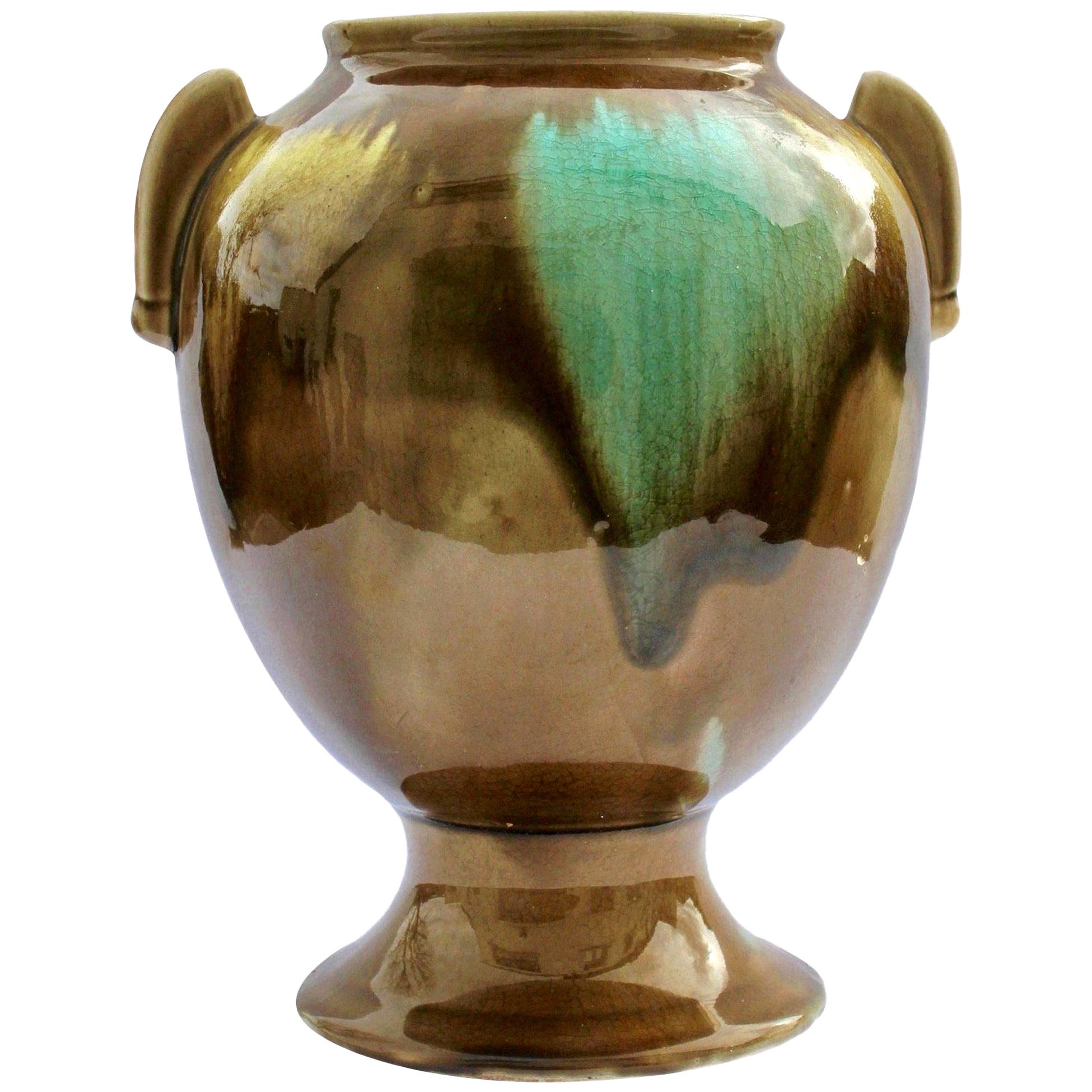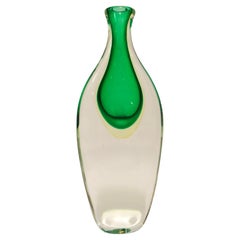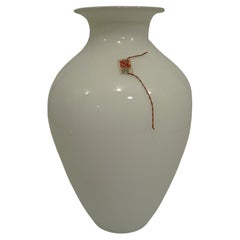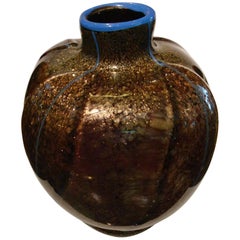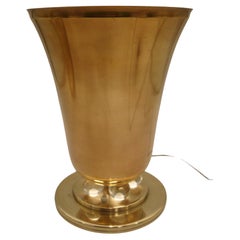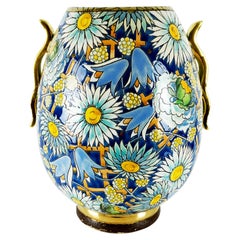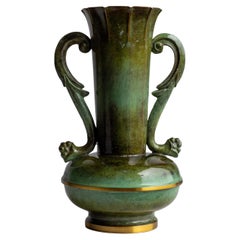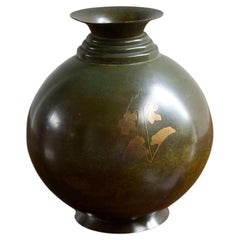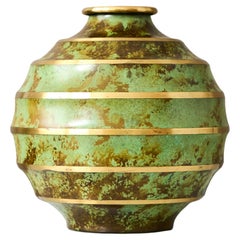Items Similar to Art Deco Boch La Louviere Brass Mounted Glazed Vase. Belgium 1920´s
Want more images or videos?
Request additional images or videos from the seller
1 of 14
Art Deco Boch La Louviere Brass Mounted Glazed Vase. Belgium 1920´s
$2,800
$3,50020% Off
£2,125.71
£2,657.1420% Off
€2,431.36
€3,039.2020% Off
CA$3,912.01
CA$4,890.0120% Off
A$4,351
A$5,438.7620% Off
CHF 2,271.96
CHF 2,839.9520% Off
MX$52,947.10
MX$66,183.8720% Off
NOK 29,016.39
NOK 36,270.4920% Off
SEK 27,212.25
SEK 34,015.3220% Off
DKK 18,146.18
DKK 22,682.7320% Off
Shipping
Retrieving quote...The 1stDibs Promise:
Authenticity Guarantee,
Money-Back Guarantee,
24-Hour Cancellation
About the Item
Art Deco Boch La Louviere Brass Mounted Glazed Vase. Belgium 1920´s.
Very Rare blue Glazed ceramic vase. The vase has a hexagonal shape and is adorned with bronze or brass decorative elements. There is a band around the top and middle of the vase, with a central decorative piece featuring floral motifs. The vase's vibrant blue color and intricate metalwork make it visually striking.
We have specialized in the sale of Art Deco and Art Nouveau and Vintage styles since 1995. If you have any questions we are at your disposal. Pushing the button that reads 'View All From Seller'. And you can see more objects to the style for sale. Why are there so many antiques in Argentina?
In the 1880 – 1940 there was a grate wave of immigration encouraged by the periods of war that were taking place. 1st World War took place between 1914 and 1918 2nd World War took place between 1939 and 1945 The immigrants options were New York or Buenos Aires. Tickets were cheap and in Buenos Aires they were welcomed with open arms, as it was a country where everything was still to be done. Argentina was the country of new opportunities, labour was needed and religious freedom was assured, in many cases the of the family travel first until they were settled and then the rest of the family members join them. In the immigrant museum “Ellis Island Immigrant Building” in New York you can se the promotional posters of the boats that would take them to a new life. Between the years 1895 and 1896, Argentina had the highest DGP (gross domestic product) per capita in the world according to the Maddison Historical Statistics index, this situation arose due to the large amount of food being exported to European countries, which were at war. The Argentinean ships left the port of Buenos Aires with food, but they returned with furniture, clothes and construction elements, (it´s common to see this the old buildings of the historic neighbourhood of San Telmo, the beams with the inscription “Made in England)”, as well as many markets that were built in Buenos Aires, such us the San Telmo Market, whose structure was brought by ship and afterwards assembled in 900 Defensa Street. With the great influence of European immigrants living in the country, the children of the upper classes travelled to study in France, resulting in the inauguration of “La Maison Argentinienne”, on 27th of June 1928, in the international city of Paris, which hosted many Argentinians that were studying in Frace. It´s the fourth house to be built after France, Canada and Belgium, being the first Spanish-speaking one. Still in place today (17 Bd Jourdan, 75014, Paris, France). Many of the children of these wealthy families who attended international art exhibitions, museums and art courses abroad, took a keen interest in the European style. This is why Buenos Aires was at the time referred as “The Paris of South America”. Between the years 1890 and 1920 more than a hundred Palaces were built on Alvear Avenue the most exclusive avenue in Buenos Aires. Today some of these palaces have been transformed into museums, hotels and embassies. In the year 1936, the Kavanagh building was inaugurated, it was the tallest reinforced concrete building in South America. During 1994 the American Society of Civil Engineers distinguished it as an “international engineering milestone”, and it´s now considered a World Heritage of Modern Architecture. At the time was common to hire foreign architects such as Le Corbusier, who visited Buenos Aires/Argentina in 1929 and in 1948 he drew up the blueprints for a house built in La Plata City (which was declared a World Heritage Site). In 1947, the Hungarian architect Marcelo Breuer designed “Parador Ariston” in the seaside city of Mar del Plata. After an Argentinean student at Harvard University convinced him to come to Argentina. He worked on an urban development project in the Casa Amarilla, area of La Boca. The Ukrainian architect, Vladimiro Acosta, arrives in Argentina in 1928 and worked as an architect until que moved to Brazil. Antonio Bonet, a Spanish architect who worked with Le Corbusier in Paris, arrives in Argentina in 1937, where he carried out several architectural works and in 1938 designs the well-known BFK chair. Andres Kálnay, of Hungarian origin, made around 120 architectural masterpieces, among which the former Munich brewery stands out, he even made the furniture’s design. The German architect, Walter Gropius, director of the Bauhaus, lived in Argentina, where he wrote articles for “Sur” magazine and founded in Buenos Aires, an architectural firm with Franz Möller, who was also an architect, where he built two houses. At the same time several famous designers decided to immigrate to Argentina, among them we can find the well-known French designer, Jean-Michel Frank, who arrived in the country in 1940 and also worked for the Rockefeller family. Special pieces were made, which were sold exclusively in the country, such as the well-known German company “WMF”, who sold their products by catalogue, which were chosen by the ladies of high society in the list of wedding gifts, as well as the pieces designed by Christofle. The Swiss sculptor Alberto Giacometti, made special pieces for Argentinean mansions. In 1904 the first Jansen branch outside Paris was established in Buenos Aires, as the Argentinean clientele demanded a large amount of furniture, from the end of the 19th century to the mid-20th century. In 1970, the brand Rigolleau Argentina made pieces authorised by Lalique. The brands Maple and Thompson also set up shop in the country. The French plastic artist, Marcel Duchamp moved to Argentina in 1918-1919. Glass signed Gallé, Charder, Leverre, Schneider, Muller and other French firms. They were bought in flower shops and were given to ladies with beautiful floral arrangements. Some furniture manufacturers travelled to international fairs and bough the patterns to produce the furniture in Argentina, such as the furniture firm Englander and Bonta, who bought the patterns in Italy. It is worth mentioning that in Argentina we have the largest community of Italians outside of Italy, as it is estimated that 70 percent of the inhabitants have at least one Italian descendant, followed by Spanish immigrants. The most Important furniture stores in Argentina: Comte is founded in 1934 (under the direct management of Jean Michel Frank in 1940). Nordiska (Swedish company established in 1934). Churba in 1960, a company that brought foreign designers to present their furniture in the country: Denmark: (Arne Jacobsen, Finn Juhl, Bender Madsen, Ejner Larsen, Poul Kjaerholm, Hans Wegner) Sweden: (Hans Agne Jakobsson, Gustavsberg) United States: (Herman Miller) Finland: (Lisa Johansson, Folke Arstrom, Tapio Wirkkala, Alvar Aalto, Timo Sarpaneva) Swedish Factory: (Orrefors) Italy: (Littala, Vico Magistretti, Emma Gismondi, Gae Aulenti, Angelo Mangiarotti, Elio Martinelli, Gianna Celada, Angelo Mangiarotti, Mario Bellini, Carlo Scarpa) Finland: (Olivia Toikka) Plata Lappas (Lappas Silver): a goldsmith shop founded in 1887 in Argentina by Alcibiades Lappas of Greek origin. In 2019, in Argentina took place “the Art Deco world congress” . Argentina currently has more than 100 Art Deco buildings and another 90 Art Nouveau buildings throughout the city of Buenos Aires. Argentina is a country that has not been involved in many wars, which is why it has been a refuge for works of art and antiques from different periods of time, unlike European countries. That is way many collectors, museums and antique dealers from all over the world visit it, you should not miss the opportunity to visit this great country.
- Creator:Boch La Louviere (Maker)
- Dimensions:Height: 11.03 in (28 cm)Diameter: 7.88 in (20 cm)
- Style:Art Deco (In the Style Of)
- Materials and Techniques:
- Place of Origin:
- Period:
- Date of Manufacture:1920´s
- Condition:Wear consistent with age and use.
- Seller Location:Buenos Aires, AR
- Reference Number:1stDibs: LU2027343269602
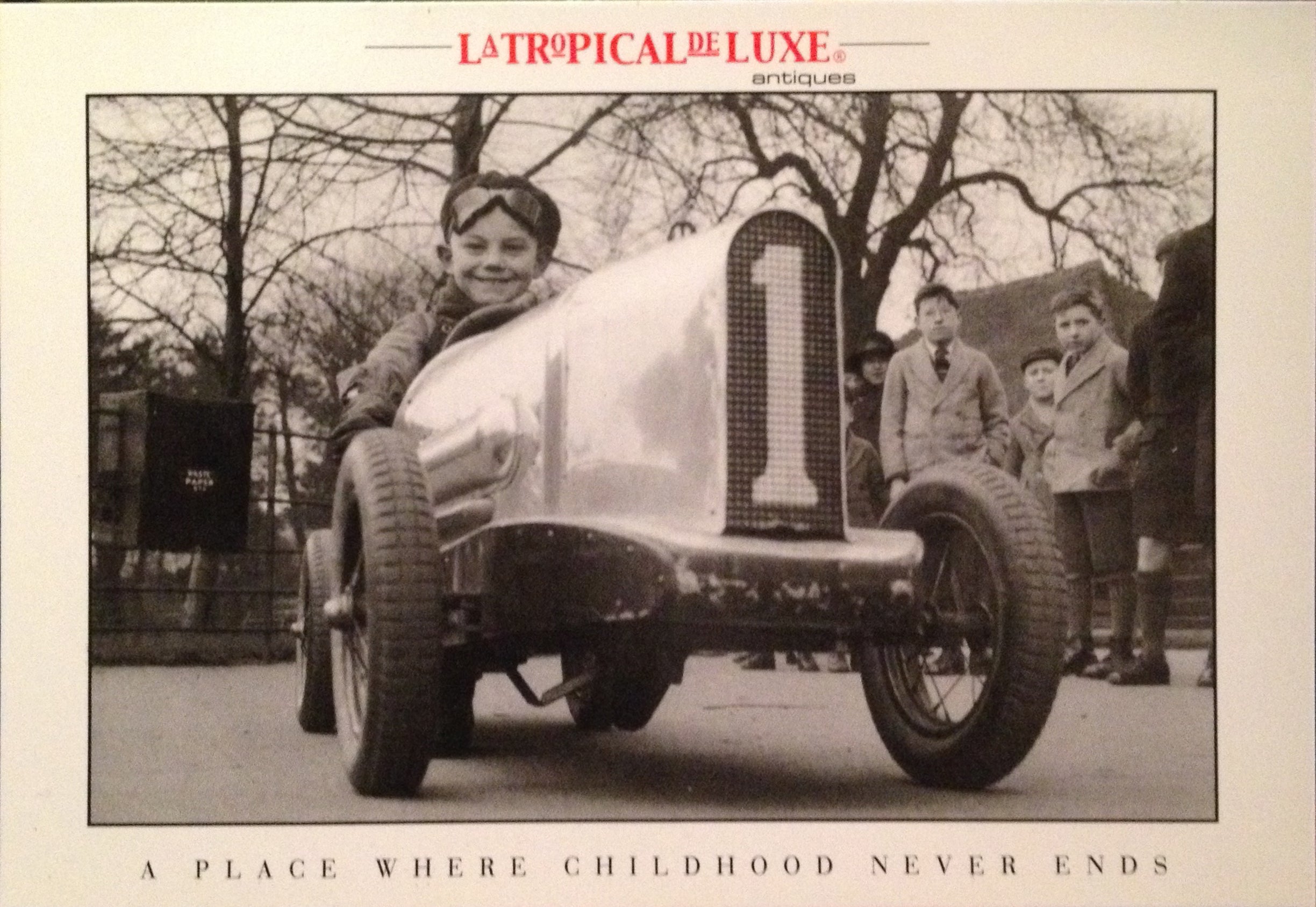
About the Seller
4.9
Vetted Professional Seller
Every seller passes strict standards for authenticity and reliability
Established in 2002
1stDibs seller since 2016
320 sales on 1stDibs
Typical response time: 1 hour
- ShippingRetrieving quote...Shipping from: Buenos Aires, Argentina
- Return Policy
Authenticity Guarantee
In the unlikely event there’s an issue with an item’s authenticity, contact us within 1 year for a full refund. DetailsMoney-Back Guarantee
If your item is not as described, is damaged in transit, or does not arrive, contact us within 7 days for a full refund. Details24-Hour Cancellation
You have a 24-hour grace period in which to reconsider your purchase, with no questions asked.Vetted Professional Sellers
Our world-class sellers must adhere to strict standards for service and quality, maintaining the integrity of our listings.Price-Match Guarantee
If you find that a seller listed the same item for a lower price elsewhere, we’ll match it.Trusted Global Delivery
Our best-in-class carrier network provides specialized shipping options worldwide, including custom delivery.More From This Seller
View AllFlavio Poli Large Sommerso Murano Glass Vase by Seguso, 1960
By Flavio Poli
Located in Buenos Aires, Olivos
Here is a wonderful 1950/60's Murano glass vase, made on the island of Murano, near Venice, Italy. In a stunning combination of Green glass encased in clear glass, using the renowned...
Category
Mid-20th Century Italian Mid-Century Modern Vases
Materials
Murano Glass
Large Snow White Murano Flower Vase by Barovier e Toso. Italy, 1970s
By Barovier&Toso
Located in Buenos Aires, Olivos
Large snow white Murano flower vase By Barovier e Toso. Italy, 1970s.
Signed Barovier Toso Murano and with original label. Hard to find.
We have sp...
Category
Vintage 1970s Italian Mid-Century Modern Vases
Materials
Murano Glass
Mid-Century Fantastic Italian Murano Flower Vase, Blue, Purple with Gold, 1950´s
Located in Buenos Aires, Olivos
Mid Century Italian Murano flower vase. Blue, Purple with Gold
We have specialized in the sale of Art Deco and Art Nouveau and Vintage styles sinc...
Category
Vintage 1950s Italian Modern Vases
Materials
Murano Glass
$1,999 Sale Price
62% Off
Free Shipping
Art Deco Uplight Brass Metal Table Lamp, French, 1930s
Located in Buenos Aires, Olivos
A lovely example of Art Deco that shows great style and imagination is this French table lamp trumpet shape. Cream coloured on the inside and takes a normal bulb, you can use energy ...
Category
Mid-20th Century French Art Deco Table Lamps
Materials
Brass
Art Nouveau Flower Vase Limoges Porcelain and Silver by Joe Descomps
By Limoges, Joe Descomps Cormier
Located in Buenos Aires, Olivos
Flower vase
On one side it has a nude - Erotic lady drinking wine, and on the other a devil. Very nice quality enamel porcelain flower vase. It has silver rings on the neck and on t...
Category
20th Century French Art Nouveau Porcelain
Materials
Porcelain
$750 Sale Price
21% Off
Barovier Toso Italian Vintage Art Glass Rostrato Murano Vase / Bowl, circa 1938
By Ferro Toso Barovier, Ercole Barovier
Located in Buenos Aires, Olivos
Barovier Toso Italian vintage art glass Rostrato Murano vase / bowl, circa 1938
An exquisite mid-20th century centrepiece by Barovier & Toso in b...
Category
Mid-20th Century Italian Mid-Century Modern Glass
Materials
Murano Glass
$1,760 Sale Price
20% Off
You May Also Like
Art Deco vase – Belgium 1925
By Boch La Louviere
Located in Girona, Girona
Art Deco vase in enamelled ceramic with floral and geometric motifs, partially gilded handles and base.
Created by Raymond Chevallier (1900-1959), successor to Charles Catteau.
Produ...
Category
Vintage 1920s Belgian Art Deco Vases
Materials
Ceramic
Swedish Grace Bronze Patinated Metal Handle Vase, Scandinavian Art Deco, 1930s
Located in Stockholm, SE
This exquisite vase, originating from Sweden and dating to the 1930s, is a remarkable example of Scandinavian Art Deco design. Produced by the lesser-known company Svea Metals, it sh...
Category
Vintage 1930s Swedish Art Deco Vases
Materials
Metal, Brass
$584 Sale Price
35% Off
Free Shipping
Art deco bronze vase by Krone Bonce, Denmark ca. 1930
Located in Balen, BE
Art deco bronze vase by Krone Bonce, Denmark ca. 1930
This exquisite Art Deco bronze vase, crafted by Krone Bonce of Denmark circa 1930, showcases the era's distinctive style with a...
Category
Vintage 1930s Danish Art Deco Vases
Materials
Bronze
Bronze Art Deco Vase by SVM Handarbete, Sweden, 1930s
By SVM Handarbete 1, GAB Guldsmedsaktiebolaget, Ewald Dahlskog
Located in Malmö, SE
A beautiful art deco bronze vase with amazing patina.
Made by SVM, Svenska Metallverken AB, Sweden, 1930s.
Great condition, but with an inscription (pictured).
Stamped 'HANDARBET...
Category
Vintage 1930s Swedish Scandinavian Modern Vases
Materials
Bronze
Art Deco Vase brass and copper conbination vienna around 1920s
Located in Wien, AT
Art Deco Vase brass and copper conbination vienna around 1920s
Polished and stove enameled
Category
Vintage 1920s Austrian Art Deco Vases
Materials
Brass, Copper
Art Deco Handmade and Hand Glazed Planter Jardinière, 1930, Belgium
Located in Verviers, BE
Brilliant handmade hand-glazed Art Nouveau planter jardinière, 1930.
Handmade and hand-glazed in brilliant colored details.
Made in Belgium
Art Nouveau period 1930 fine quality....
Category
Vintage 1930s Belgian Art Deco Planters, Cachepots and Jardinières
Materials
Ceramic
